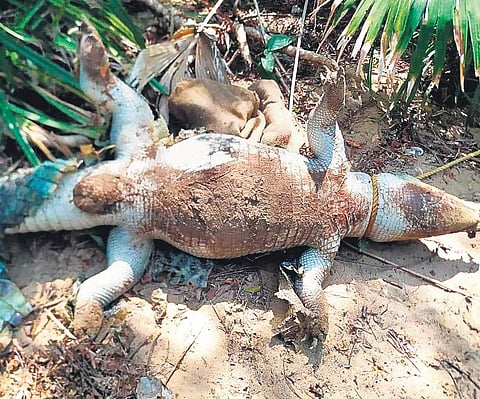

CHENNAI: IN a huge loss, a Cuban crocodile has died mysteriously at the Madras Crocodile Bank Trust, located about 45 km south of Chennai on the East Coast Road. The Cuban crocodile is a critically endangered species and the Madras Crocodile Bank is the only facility in all of Asia to preserve pure gene pool of this species.
A few years ago, the crocodile bank sourced one male and four female Cuban crocodiles for revival. On the night of March 30, one young female crocodile, which had no medical history of illness, died. Though the exact cause is yet to be ascertained, conservationists suspect it could be due to the stress caused by loud music emanating from a newly built star hotel in neighbourhood.
Internationally renowned herpetologist Romulus Whitaker, one of the early founders of the Madras Crocodile Bank, has expressed shock at the development. In a Facebook post that has gone viral, Whitaker said the death “coincided with another roaring event at the Sheraton Grand Chennai Resort & Spa next door.”
“Heavy bass music was being played in its lawn area and continued in spite of repeated requests to lower the volume. There is no doubt in my mind that the animal died as a result of stress caused by the vibrations,” he said. “The Cuban crocodile enclosure is around 50 ft from the wall which divides the hotel from us and the powerful hi-fidelity speakers had been placed right next to it.”
“The animal had been healthy, had fed recently, and had no injuries or history of sickness. This is a critical breeding group of one of the most endangered animals in the world: 1 male and 4 (now 3) females. Extremely lucky that it wasn’t the male who succumbed. We will now consider moving the group to another location, an expensive and difficult undertaking. As one of the founders of the Croc Bank, I am shattered by this loss. This is really too much!,” he said.
He told Express that the crocodile was about 12 years old and was matured enough for breeding. “We were expecting breeding to happen any time. The hotel acted positively on our previous complaints and reduced the decibel levels, but the low frequency bass music is the real issue. There is no proof that sound killed the animal, but what else it would be. They were healthy animals. After the hotel came up, crocodiles’ social behaviour has changed. They began getting excited and started fighting causing a few injuries as well. The birds have completely deserted the campus. Earlier, we could spot at least 2,000 Egrets during nesting season.”
Sources said the Madras Crocodile Bank is planning to hold a press conference on April 20 to voice its concerns. “A short paper on this whole issue of noise and its effects on animals is likely to be released.”
Officials said the Crocodile Bank has a well-defined veterinary care working hand in hand with the curatorial staff to ensure that all animals are healthy. Regular screening and treatment protocol is followed and all individual animals are Pit Tagged, a unique identification number that helps to keep track of medical histories. “So there is no logical explanation to the death of Cuban crocodile.”
Similar concerns were raised in February as well. The decibel monitors in crocodile bank were regularly exceeding legal limits. But, after a dialogue, the hotel assured that they would comply with the legal regulations in terms of acceptable decibel limits and permitted timings.
When contacted, Shibil Malik, General Manager of Sheraton Grand Chennai Resort & Spa, told Express: “We at Sheraton Grand Chennai Resort & Spa are committed to safeguarding our environment and have always adhered to the laws of the land. We have been proactively working with the Madras Crocodile Bank on the concerns raised by them, post our last meeting in the month of February. We assure the authorities concerned of our fullest support.”
One of the World’s most endangered crocodile species